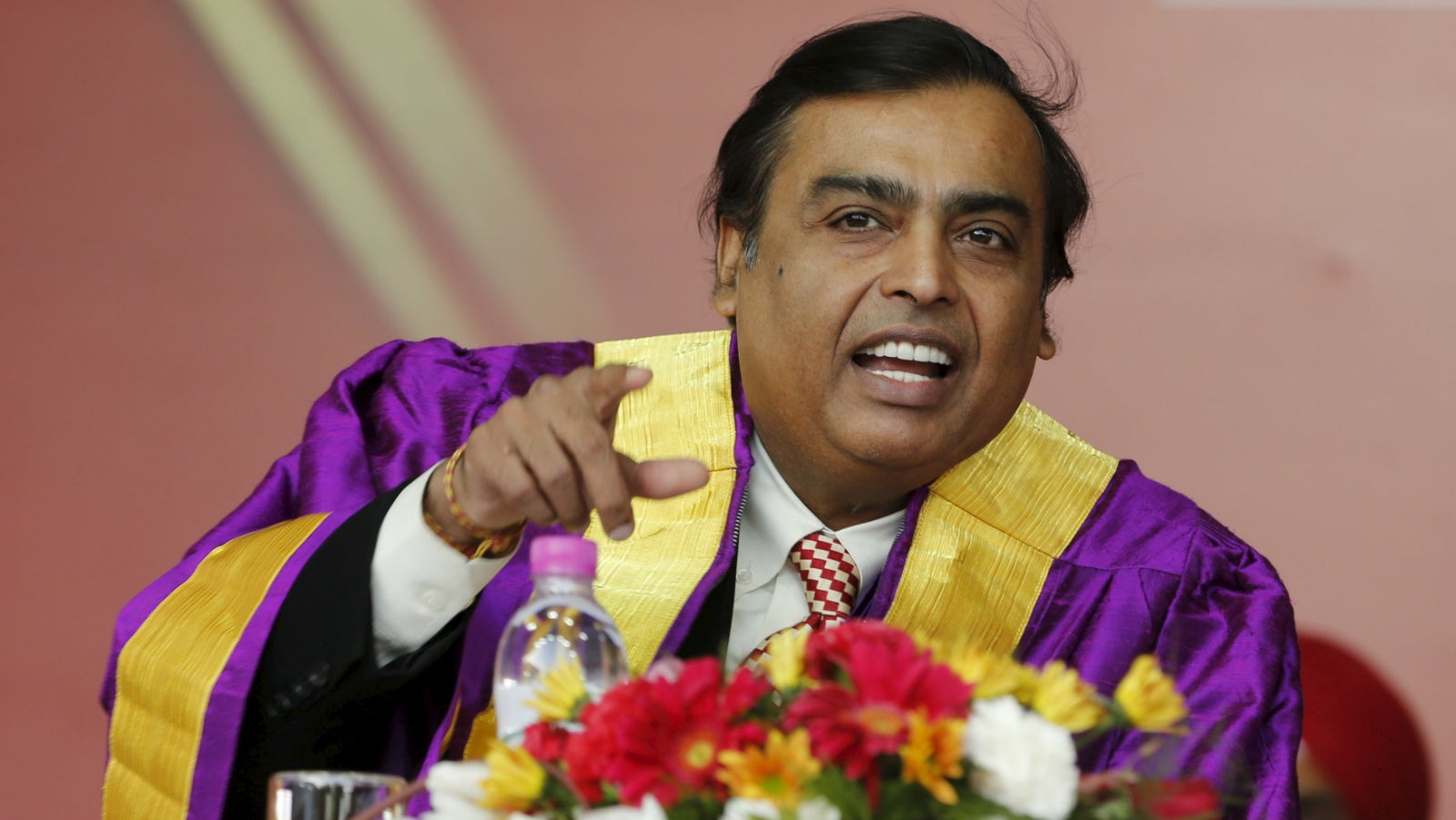What’s on India’s richest man’s mind? Five takeaways from rare, long interviews with Mukesh Ambani
It’s been a week since Reliance Industries (RIL) chairman Mukesh Ambani ushered in a new era in the $50-billion Indian telecom industry with the launch of his Reliance Jio.


It’s been a week since Reliance Industries (RIL) chairman Mukesh Ambani ushered in a new era in the $50-billion Indian telecom industry with the launch of his Reliance Jio.
The new company’s ambitious agenda rides on its promise of free services till the end of the year and dirt-cheap 4G data thereon.
On Sept. 07, the country’s richest man, whose personal fortune exceeds $22 billion, spoke to two newspapers, The Times of India and the Economic Times, touching upon varied subjects.
Here are the key takeaways from the two interviews.
On his father’s legacy
“There is only one Dhirubhai. I am a very small part of Dhirubhai. For us, his spirit is timeless. It will continue to inspire and guide Reliance beyond me. He had given me a mandate and it is very satisfying to fulfil it. He had told me that the process of Reliance should last beyond you and me,” he told the Economic Times.
“Reliance will always be Dhirubhai’s Reliance.”
Dhirubhai Ambani founded RIL in 1966 as a small textile manufacturing unit. Before that, he worked as a petrol pump assistant in Yemen. On his death in 2002, his empire was divided between his sons Anil and Mukesh. The split units went on to become giants on their own.
On the telecom wars
In the run-up to its launch, a clutch of telecom firms in India alleged that Jio was stepping on regulations and providing full services to consumers under the garb of trial. Ambani refuted these accusations.
“I am struggling to find out what the accusation is. Is it that we conducted trials? When you are doing so many things for the first time, it is better to do trials. We were transparent about it and we have written to everybody, including our competitors,” he told the Times of India.
“Why will I not give free service to my customers to get them used to mobile internet, and to get every small town and village to use it? Everybody does promotions. In the internet world, free is normal.”
On the future of Jio
Ambani has ambitious plans: adding some 100 million Jio customers in the shortest time.
“I believe 50 years from now when you write history, one technology that would have changed human civilization is going to be the mobile internet. In 2011 it was hazy. In 2002, it was even hazier. But today, I have no doubts, the world has no doubts, that mobile internet is a life-changing, world-changing technology of this century,” he told The Times of India.
On Narendra Modi
A day after the Jio announcement, major newspapers in India had carried full-page advertisements of the service with a picture of prime minister Narendra Modi. The ad drew flak and some questioned the propriety of using the prime minister’s photo to promote a private firm.
“Frankly, this is a baseless controversy. Shri Narendra Modi is the country’s prime minister. He’s as much your prime minister as he is my prime minister,” Ambani told the Economic Times. ”He has given the Digital India vision, which I am personally inspired by.”
On RIL’s core business
Though Jio has hogged the limelight recently, RIL’s core business is still oil and gas. The firm has had an enviable history of stellar profit margins, making it one of India’s most valuable companies.
“Reliance has built a refinery-led energy business and a materials business,” Ambani told the Economic Times. “In the energy business, we give 2% of the world’s petrol, diesel, and aviation fuel. For that, we need some backward integration into oil and gas. I myself believe that… renewable forms of energy in the next 20-30 years will replace nearly all fossil fuels.”